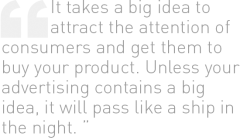Much of public health is about communicating and communicating EFFECTIVELY (!). Sadly, it is this area which is typically weak in public health agencies dealing with information dissemination and behavioral modification. How can we as public health professionals compete for mind share amidst all the ‘noise’ out there and get our messages not only heard but acted upon?
public health agencies dealing with information dissemination and behavioral modification. How can we as public health professionals compete for mind share amidst all the ‘noise’ out there and get our messages not only heard but acted upon?
It’s honestly not about the budget (If it were we might as well switch off the lights and go home) but the creativity in messaging and the intimate knowledge of the end user/ customer/ client/ citizen.
 David Ogilvy, the ‘Father of Advertising’, who was responsible for copy such as “Only Dove is one-quarter moisturizing cream” which helped Dove become the top selling soap in America has written extensively about advertising and copy. These are largely in the public domain and it is well worth the public health professional’s time to study in detail the techniques of the man Time magazine once described as “the most sought-after wizard in today’s advertising industry” (Ogilvy died in 1999).
David Ogilvy, the ‘Father of Advertising’, who was responsible for copy such as “Only Dove is one-quarter moisturizing cream” which helped Dove become the top selling soap in America has written extensively about advertising and copy. These are largely in the public domain and it is well worth the public health professional’s time to study in detail the techniques of the man Time magazine once described as “the most sought-after wizard in today’s advertising industry” (Ogilvy died in 1999).
 Reading and re-reading the writings and sayings of David Ogilvy (I confess I am susceptible to being bogged down by the ‘urgent if unimportant’ and do forget too how important it is to constantly refresh oneself intellectually), I was and continue to be enthralled by the wit, wisdom and incisiveness. Below are two pieces on writing and advertising that if I was in charge of public health training, I would require every trainee/ resident to read and commit to memory.
Reading and re-reading the writings and sayings of David Ogilvy (I confess I am susceptible to being bogged down by the ‘urgent if unimportant’ and do forget too how important it is to constantly refresh oneself intellectually), I was and continue to be enthralled by the wit, wisdom and incisiveness. Below are two pieces on writing and advertising that if I was in charge of public health training, I would require every trainee/ resident to read and commit to memory.
HOW TO WRITE
The better you write, the higher you go in Ogilvy & Mather. People who think well, write well.
Woolly minded people write woolly memos, woolly letters and woolly speeches.
Good writing is not a natural gift. You have to learn to write well. Here are 10 hints:
1. Read the Roman-Raphaelson book on writing (Writing that Works, Harper and Row 1981). Read it three times.
2. Write the way you talk. Naturally.
3. Use short words, short sentences and short paragraphs.
4. Never use jargon words like re-conceptualize, demassification, attitudinally, judgmentally. They are hallmarks of a pretentious ass.
5. Never write more than two pages on any subject.
6. Check your quotations.
7. Never send a letter or a memo on the day you write it. Read it aloud the next morning — and then edit it.
8. If it is something important, get a colleague to improve it.
9. Before you send your letter or your memo, make sure it is crystal clear what you want the recipient to do.
10. If you want ACTION, don’t write. Go and tell the guy what you want.
ON ADVERTISEMENTS
Every advertisement must tell the whole sales story, because the public does not read advertisements in series.
The copy must be human and very simple, keyed right down to the market- a market in which self-conscious artwork and fine language only serves to make buyers wary.
Every word in the copy must count. Concrete figures must be substituted for atmospheric claims; clichés must give way to facts, and empty exhortations to alluring offers.
Facetiousness in advertising is a device dear to the amateur but anathema to the advertising agent, who knows that permanent success has rarely been built on frivolity and that people do not buy from clowns.
Superlatives belong to the market place and have no place in a serious advertisement; they lead readers to discount the realism of every claim.
Apparent monotony of treatment must be tolerated, because only the manufacturer reads all his own advertisements.